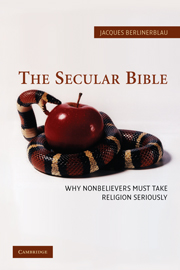Book contents
- Frontmatter
- Contents
- Preface and Acknowledgments
- Introduction: Secularists and the Not Godless World
- PART ONE THE COMPOSITION OF THE HEBREW BIBLE
- PART TWO THE INTERPRETERS OF THE HEBREW BIBLE
- PART THREE POLITICS AND SCRIPTURE
- 6 On Jewish Intermarriage: The Bible Is Open to Interpretation
- 7 Same-Sex Eroticism and Jerry Falwell
- 8 The Secular Qur'ān?
- Conclusion: Beyond Church and State: New Directions for Secularism
- Notes
- Index of Biblical Citations
- Index of Qur'ānic Citations
- Index of Rabbinic, Early Jewish, and Patristic Citations
- Index
8 - The Secular Qur'ān?
Published online by Cambridge University Press: 05 June 2012
- Frontmatter
- Contents
- Preface and Acknowledgments
- Introduction: Secularists and the Not Godless World
- PART ONE THE COMPOSITION OF THE HEBREW BIBLE
- PART TWO THE INTERPRETERS OF THE HEBREW BIBLE
- PART THREE POLITICS AND SCRIPTURE
- 6 On Jewish Intermarriage: The Bible Is Open to Interpretation
- 7 Same-Sex Eroticism and Jerry Falwell
- 8 The Secular Qur'ān?
- Conclusion: Beyond Church and State: New Directions for Secularism
- Notes
- Index of Biblical Citations
- Index of Qur'ānic Citations
- Index of Rabbinic, Early Jewish, and Patristic Citations
- Index
Summary
Whoever loves and admires the Qur'ān loves God and his Messenger; whoever abhors the Qur'ān abhors God and his Messenger.
Ghazzālī, ihyā ‘ulūm ad-dinToday's secularists have an adversary and that adversary is not religion per se. Rather, it is religious extremism and, in this regard, we hasten to add that the secularly religious share precisely the same nemesis. Of all the monotheistic extremisms, it is currently the Islamic variety that nonbelievers (and others) should monitor most carefully. This is not to downplay the dangers presented by Jews erecting trailer parks on Palestinian lands or assassinating their own democratically elected leaders. Nor is it to disregard Christians who stalk abortion clinics and gay bars. If properly empowered, these groups are as capable of making the world an insufferable place (or a nonexistent place) as their Muslim counterparts. Of late, however, radical Islamists have distinguished themselves in terms of their growing numbers, the international scope of their activities, and their unbridled enthusiasm for mass homicide. The possibility that their ancient ideology of martyrdom might one day “shake hands” with modernity's arsenal of apocalypse is enough to make all civilized persons edgy, especially that majority of nonextremist Muslims residing in their immediate vicinity.
At this point, it is obligatory to declare that these militants are not true practitioners of their faith. The real Islam has been hijacked. The authentic message of the Qur'ān has been distorted.
- Type
- Chapter
- Information
- The Secular BibleWhy Nonbelievers Must Take Religion Seriously, pp. 116 - 129Publisher: Cambridge University PressPrint publication year: 2005



